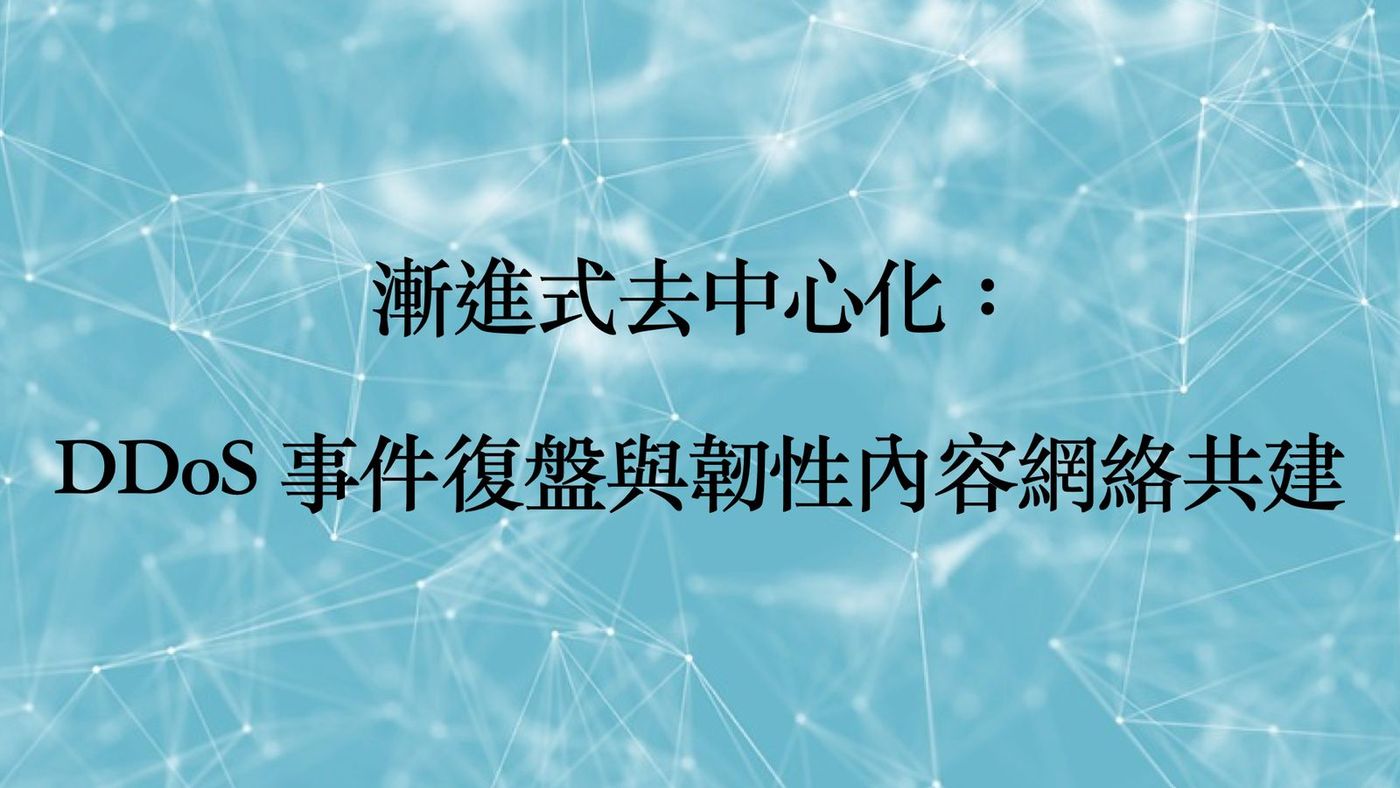Progressive Decentralization: DDoS Incident Review and Resilient Content Network Co-construction
From July 28 to August 12, 2022, over two weeks, Matters.News suffered the largest and most sustained DDoS attack since its inception. The IPs that launched the attacks were distributed all over the world, mainly the United States, Indonesia, India, Germany and Singapore. The attack period was concentrated in the working hours of the East Eighth District, reaching 4 million requests per second at peak. The attack targets include Matters.News' SSR server and API server. When we switched the API server address, the attacker also updated the address.
The DDoS attack method is to overload the server with a large number of requests, preventing the user from using the service normally, but does not and will not bring any impact to the user's data, content and assets . At present, we have completed the migration of the Matters.News website architecture to a more DDoS-resistant architecture, and various services have returned to normal. However, due to architecture migration and additional defense measures, users in some regions may experience instability when accessing, and we will optimize and resolve them in the next few weeks. We will also sort out the data of the attack for interested users and security personnel to study.
Given the scale and duration of this attack, we do not yet know the attacker's intentions and can only assume that it may continue to occur in the future. Rather, it validates our original intention - the urgency of a polycentric, resilient content network .
The split in the real world has long since made the cyberspace unconnected. We know how fragile an autonomous and open digital space is, and we also know that the free connection and free expression of people need to be fought for by ourselves. The emerging Web3 provides an opportunity for us to build the attributes of autonomy and openness into the network structure with the logic of code, instead of relying entirely on the maintenance of social organizations.
Decentralized Web3 reconfirms digital property rights, which first brings the capitalization of digital space. The first prosperous decentralized finance relies on miners, wallet clients, exchanges, and node operators to form a rich ecosystem. But for decentralized content and social networks, the value network and speech market of users, clients, people and content are still in the process of emerging from centralization. From the thunderstorm of Celsius Network to the US government's order to block the Tornado Cash contract, it has been shown that although decentralization can ensure the security of assets and data, the still budding Web3 is still very vulnerable because of centralization.
We want to be able to prepare the content ecosystem before the online environment gets worse. In 2018, when we launched Matters.News, we prioritized user experience, even at the expense of some decentralization, including functions that are essential to users and are essentially centralized, such as search, recommendation, notification, etc. We also believe that in addition to a single application, what is truly decentralized and resilient is an ecosystem consisting of applications and protocols designed around common design, and consists of builders around a specific consensus.
Therefore, Matters has been working with important partners in the ecosystem to build a larger decentralized content ecosystem. Including IPFS, Meson.Network, Crust Network, LikeCoin, ENS that have established cooperation, Polygon, Planet, RSS3 and so on that are cooperating.
Matters Lab will continue to make it easier for creators and readers to access the decentralized web. This includes making it easy for users who use web pages to publish content, donate virtual currency, etc., as well as providing storage in the IPFS network for users using clients such as Planet. We will also make content storage in IPFS more reliable and distribution more efficient through our cooperation with Crust Network. There are still many unknown issues here, such as how to pay for the cost of content storage to be both sustainable and acceptable to users. But what is certain is that we can take this one step closer to data autonomy.
More importantly, Matters Lab will focus on the construction of a value network: continue to allow good content to be discovered and rewarded, and allow creators to find their own supporters and communities . The larger the content network is, the more critical the content discovery mechanism is, which is a key part of condensing and capturing value. At this point, we believe that people should not completely hand over their thoughts to collective machines, and that the selection and curation of content needs to be done by more organic people and communities. Reasonable economic mechanism design can emerge consensus and motivate those who contribute to each other within the community. This is what Matters Lab hopes to provide: an economic model that makes the content ecology healthy and sustainable, allowing readers to regain their autonomy and creators to live .
Over the past period, Matters Lab has conducted many experiments to explore economic rules suitable for the content ecology. From the eye-catching Logbook on-chain notebook, TheSpace.Game co-creation canvas, to the imperceptible "hot" algorithm design, tracking information flow improvement, all provide the basis for the next design. In the next period of time, we will gradually release the economic model of Matters, discuss and iterate with users.
To achieve a decentralized, user-owned content ecosystem requires incremental bottom-up efforts, as well as the collaboration of different products and communities. It's time for Matters Lab to enter the next chapter with high-quality projects emerging in the ecosystem and start a comprehensive cooperation.

Like my work? Don't forget to support and clap, let me know that you are with me on the road of creation. Keep this enthusiasm together!













- Author
- More